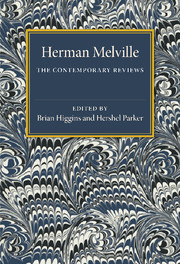Book contents
- Frontmatter
- Contents
- Series Editor's Preface
- Introduction
- AMERICAN CRITICAL ARCHIVES 6
- Typee (1846)
- Omoo (1847)
- Mardi (1849)
- Redburn (1849)
- White-Jacket (1850)
- Moby-Dick (1851)
- Pierre (1852)
- Israel Potter (1855)
- The Piazza Tales (1856)
- The Confidence-Man (1857)
- Battle-Pieces and Aspects of the War (1866)
- Clarel (1876)
- John Marr and Other Sailors with Some Sea-Pieces (1888)
- Billy Budd (posthumous)
- Index
Billy Budd (posthumous)
Published online by Cambridge University Press: 01 April 2010
- Frontmatter
- Contents
- Series Editor's Preface
- Introduction
- AMERICAN CRITICAL ARCHIVES 6
- Typee (1846)
- Omoo (1847)
- Mardi (1849)
- Redburn (1849)
- White-Jacket (1850)
- Moby-Dick (1851)
- Pierre (1852)
- Israel Potter (1855)
- The Piazza Tales (1856)
- The Confidence-Man (1857)
- Battle-Pieces and Aspects of the War (1866)
- Clarel (1876)
- John Marr and Other Sailors with Some Sea-Pieces (1888)
- Billy Budd (posthumous)
- Index
Summary
[John Middleton Murry]. “Herman Melville's Silence.” London Times Literary Supplement, 10 July 1924.
In 1851 Herman Melville published “Moby Dick”; in the next five years “Pierre,” which was received with cold hostility, “Israel Potter,” and the “Piazza Tales.” Then, to all intents and purposes, there was silence till the end, which did not come till thirty-five years later. The silence of a great writer needs to be listened to. If he has proved his genius, then his silence is an utterance, and one of no less moment than his speech. The silence of a writer who has the vision that Melville proved his own in “Moby Dick” is not an accident without adequate cause; and that we feel that silence was the appropriate epilogue to Melville's masterpiece is only the form of our instinctive recognition that the adequate cause was there. After “Moby Dick” there was, in a sense, nothing to be said, just as after King Lear there seemed nothing for Shakespeare to say. Shakespeare did find another utterance in Antony and Cleopatra: then he too was silent. For, whatever names we may give to the “romantic” plays of his final period, and however high the praises we sincerely heap upon them, they belong to another order and have a significance of another kind than the great tragedies. They are, essentially, the work of a man who has nothing more to say, but who is artist and genius enough at last to contrive a method of saying even that.
- Type
- Chapter
- Information
- Herman MelvilleThe Contemporary Reviews, pp. 547 - 552Publisher: Cambridge University PressPrint publication year: 1995



